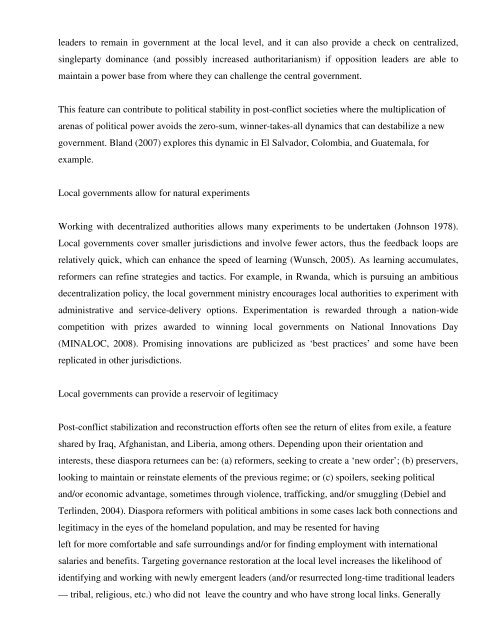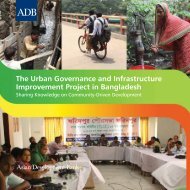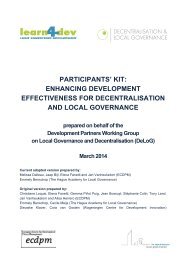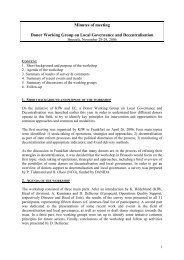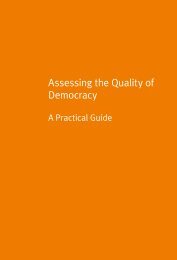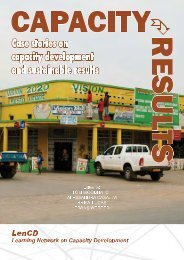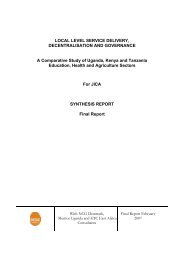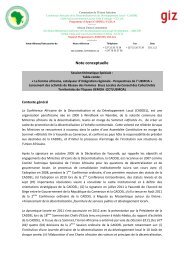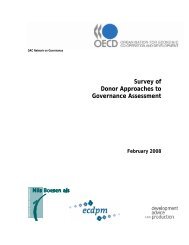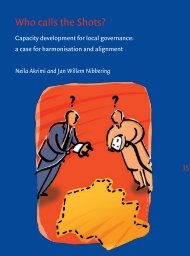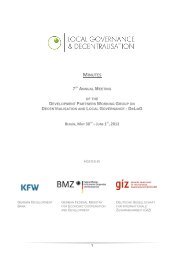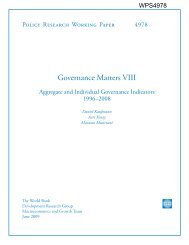Decentralized Local Governance In Fragile States ... - DeLoG
Decentralized Local Governance In Fragile States ... - DeLoG
Decentralized Local Governance In Fragile States ... - DeLoG
You also want an ePaper? Increase the reach of your titles
YUMPU automatically turns print PDFs into web optimized ePapers that Google loves.
leaders to remain in government at the local level, and it can also provide a check on centralized,singleparty dominance (and possibly increased authoritarianism) if opposition leaders are able tomaintain a power base from where they can challenge the central government.This feature can contribute to political stability in post-conflict societies where the multiplication ofarenas of political power avoids the zero-sum, winner-takes-all dynamics that can destabilize a newgovernment. Bland (2007) explores this dynamic in El Salvador, Colombia, and Guatemala, forexample.<strong>Local</strong> governments allow for natural experimentsWorking with decentralized authorities allows many experiments to be undertaken (Johnson 1978).<strong>Local</strong> governments cover smaller jurisdictions and involve fewer actors, thus the feedback loops arerelatively quick, which can enhance the speed of learning (Wunsch, 2005). As learning accumulates,reformers can refine strategies and tactics. For example, in Rwanda, which is pursuing an ambitiousdecentralization policy, the local government ministry encourages local authorities to experiment withadministrative and service-delivery options. Experimentation is rewarded through a nation-widecompetition with prizes awarded to winning local governments on National <strong>In</strong>novations Day(MINALOC, 2008). Promising innovations are publicized as ‘best practices’ and some have beenreplicated in other jurisdictions.<strong>Local</strong> governments can provide a reservoir of legitimacyPost-conflict stabilization and reconstruction efforts often see the return of elites from exile, a featureshared by Iraq, Afghanistan, and Liberia, among others. Depending upon their orientation andinterests, these diaspora returnees can be: (a) reformers, seeking to create a ‘new order’; (b) preservers,looking to maintain or reinstate elements of the previous regime; or (c) spoilers, seeking politicaland/or economic advantage, sometimes through violence, trafficking, and/or smuggling (Debiel andTerlinden, 2004). Diaspora reformers with political ambitions in some cases lack both connections andlegitimacy in the eyes of the homeland population, and may be resented for havingleft for more comfortable and safe surroundings and/or for finding employment with internationalsalaries and benefits. Targeting governance restoration at the local level increases the likelihood ofidentifying and working with newly emergent leaders (and/or resurrected long-time traditional leaders— tribal, religious, etc.) who did not leave the country and who have strong local links. Generally


